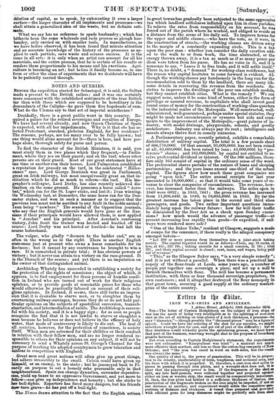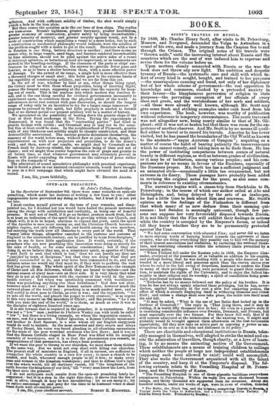Ittttro to tbt
IRON WAR-SHIPS AND ARTILLERY.
1 Adam Street, Adelphi, lgth September 1654. Sr—The letter of Captain Hodgkinson on the subject of iron ships of war has the merit of being very intelligible as to the splitting of cast-iron shot in the act of striking on iron-plates of inch thickness, I presume—be says " diameter,"— though possibly the "thousand pieces" may be a figure of speech. Could we have the ordering of the shot for our enemies, we might substitute wrought iron for cast, and get rid of part of the difficulty ; betas they ,doubtless would wickedly prefer the splintering_process, we must leave that part of the business, reserving wrought shot to the purpose of breaching granite batteries. But even according to Captain Hodgkinson's statement, the experiments were not exhaustive. "Kamptulican was tried" a material not mach more effective than sawdust, and less so than the cot-ion-bag ramparte.of IsTew Orleans; and "the iron was cased in wood on both sides, but the result was always the same." One quality of shot is the power of penetration. This will be in propor- tion to its density, unatterability of form, toughness, and sectional area, and the force with which it is propelled. If, therefore, a cast-iron shot splits in pieces in passing through iron plates, and a wrought shot does not, it is clear that the penetrating power is less. If the fragments of the shot as split, say into half-Pounds, were collected together and projected against either an iron or wooden ship, the result would be .comparatively innocuous. If, then, the iron plate had behind it a sufficient thickness of timber, the penetration of the fragments broken on the iron-might be impeded, if not at one distance at another' and experiment would settle the respective-pro- portions of distance and thickness. A vessel thus prepared and provided with efficient guns fcr long-iiistanoes might be perfectly safe from shot opters. And with sufficient solidity of timber, the shot would simply punch a hole in the iron plate. But then comes the question as to the cui bono of iron ships. The replies are numerous. Greater tightness, greater buoyancy, greater healthiness, greater economy of construction, greater safety by being incombustible; greater tenacity of material, and greater security against wreck, not by it mode of construction which assimilates a vessel to a more boiler, but by such a construction as mechanical philosophy would indicate, were the solution of the problem sought with a desire to get at the result. Structure with a view to idotation is one thing, battery structure is another ; and there seems no reason why, in large vessels, sand-bags, and fasoines rendered incombustible by lime solutions, should not be piled against the active sides of a vessel to intercept splinters, as hatteriesen land are improvised, or as hammocks are stowed in the boarding-nettings. If the closeness of the ports or ships' em- brasures be alleged as an obstacle, the answer is—provide fewer guns and heavier, Bo as to leave a shelter between them, with a more effective power of damage. To the extent of its range, a single ball is more effective than a thousand charges of small shot : this holds good to the extreme limits of the capability of constructing artillery, and we are far from this yet.
In the art of war, whether by land or sea, other things being equal, the victory must be with those whose projectiles, being of unerring flight,
possess the longest range, supposing at the same time the capacity for in keep- ing out of reach. This is the nucleus to which modern war resolves it- self, and is the one thing needful for civilized governments incessantly to experiment upon, to constitute them the physical police of the world. As astronomers never rest content with past discoveries, so should the longest range of today only be an incentive to try for a longer range tomorrow. If
i progress be pursued n this spirit, but little prophecy is needed to foretell that at no distant period our present artillery will be a matter of history.
We speculated on the possibility of beating down the granite ships of the Czar at their fixed anchorage in the Neva. Trying the experiments at Bomarsund, it was found that the "contracting parties" had filled in granite facings with rubble ; and Cronstadt may or may not be the same. But this at least could be done. In the neighbourhood of Plymouth, granite walls of any thickness and solidity might be -cheaply constructed, and their destructibility ascertained. - The--ancient granite mountains themselves, the masonry of the world before man, without flaw or joint or sham, might be experimented on with new projectors and projectiles, to do the miner's work and then sure of our results, we might deal by Cronstadt as the French dealt by 'Antwerp citadel, the calculation being of time and not of chance and we might thus render hopeless the rule of grape and granite to all future time, so that whatever government may ultimately prevail in Russia will prefer expending its resources on the railways of peace rather than on the ramparts of war. The admixture of sound speculative philosophy with practical experience, had it found a place in our national ezeoutive Councils, would have brought to pass in a first campaign that which might have obviated the need of a second.



























 Previous page
Previous page